Unit1Section A导学案
七年级英语下册Unit1 Can you play the guitar 导学案(含答案)
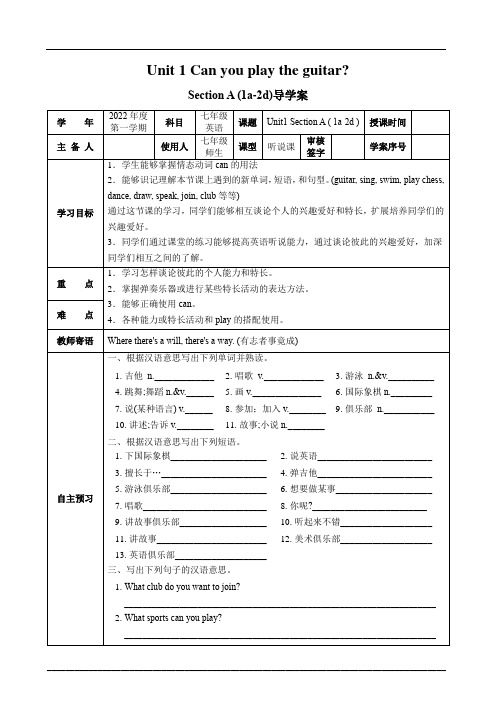
My mother tells me not to play soccer in the street.妈妈告诉我不要在街上踢足球。
【辨析】:be good for, be good at, be good with与be good to
3.You're very good at telling stories. You can join the story telling club.
____________________________________________________________________
4.I want to join the music club.
Unit 1 Can you play the guitar
Section A (1a-2d)导学案
学年
2022年度第一学期
科目
七年级英语
课题
Unit1 SectionA(1a-2d)
授课时间
主备人
使用人
七年级师生
课型
听说课
审核签字
学案序号
学习目标
1.学生能够掌握情态动词can的用法
2.能够识记理解本节课上遇到的新单词,短语,和句型。(guitar, sing, swim, play chess, dance, draw, speak, join, club等等)
检测小结
一、根据句意和图画提示补全单词
1.My bother can __________ well.
2.This is Jim’s __________. It’s new.
新目标八年级英语(上)第一单元导学案 Unit1 Section A (1a---1c)

新目标八年级英语(上)第一单元导学案Unit1 Section A (1a---1c)学习目标:1.重点短语:stay at home, go to the mountains. go to summer camp2.重点句式:Where did Tina go on vacation?She went to the mountain.学习重点:1.重点短语和句型学习难点:一般过去时态的特殊疑问句和陈述句自主学习方案:一、认真预习1a---1c,找出下列短语和句型1.待在家里.2. 去山区3.区夏令营4 去纽约城5 蒂娜去哪里度假了?,她去山区了课堂导学案方案:Step1 情景导入Teacher:Hello, everyone. Glad to see you again. Did you have a good time during the vacation? Did you go anywhere interesting with your parents? Did you do anything special there? Can you tell us where you went on vacation?Step2 完成教材1a---1c的任务1.学生领读1a中的单词和词组,学生识记单词和词组并且将活动和图片中的人物匹配。
2.认真观察1a图片中的人物活动,然后认真听录音,将1b中的人物序号写在相对应的图片旁边,完成课本上1b的听力任务。
3.再听一遍录音,并跟读对话。
4.结对练习1c中的对话,并请一些学生表演出他们的对话。
5.模仿1c中的对话,利用1a中的短语和1b中的听力答案与同伴编练新对话,并邀请一些小组表演对话。
6.小结训练:( ) 1.-----Where did you do on vacation? ------I_____to New York City.A.goB.goingC.wentD.goes( ) 2.They helped me_____my books.A.findsB.findC.foundD.finding( ) 3.What____you_____last night?A.did,doB.do,doC.did, doingD.are,do( ) 4.-----Where did she go on vacation? -----She_____to the beach.A.goB.goesC.wentD.goingStep3 问题探究1.你去哪儿度假了?Where did you go on vacation?Go on vacation 意为“去度假“2.我去了夏令营。
八年级英语上册第一单元Section A第一课时(导学案)
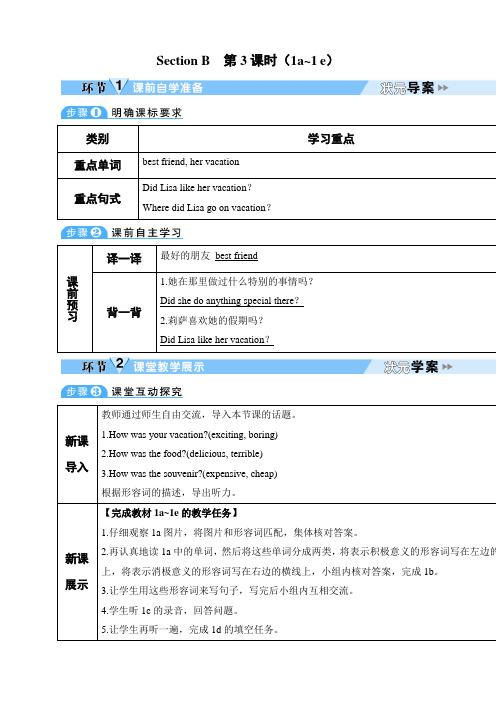
类别
学习重点
重点单词
best friend, her vacation
重点句式
Did Lisa like her vacation?
Where did Lisa go on vacation?
课前预习
译一译
最好的朋友best friend
背一背
1.她在那里做过什么特别的事情吗?
—But traveling becomes much easier!
A. convenient B. expensive C. difficult D. trendy
布置作业:教师引导学生课后完成本课时对应练习,并预习下一课时内容。
教学反思
在本课的学习中可以配以图片或者做小游戏,既加深了学生对所学单词的记忆,也丰富了课堂形式。还可以让学生依据材料,自由组合进行问答对话,进一步地强化了学生的口头表达能力
【语法提要】
cheap与inexpensive
二者都表示“便宜的”。cheap往往意为质量差,指价钱便宜的或因质量差而价格低的。inexpensive指物美价廉的,价值与价格相比而便宜,表示“价格公道的;不贵的”。
例句:The clothes in the shop are very cheap.这个商店的衣服非常便宜。
This kind of car is inexpensive.这种汽车便宜。
【问题探究】
(A)1.Where did Kim ____ vacation?
A. go on B. go in C. go to D. went on
(A)2. Jim is a boy _____brown hair.
3.让学生用这些形容词来写句子,写完后小组内互相交流。
人教版英语八年级上第一单元导学案
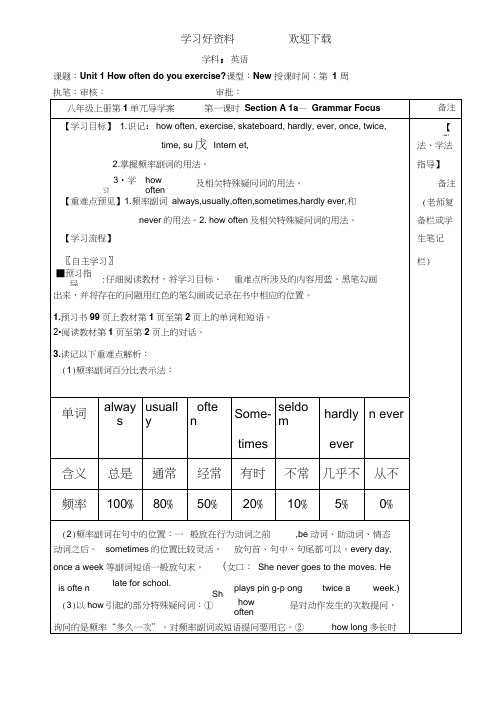
学科:英语课题:Unit 1 How often do you exercise?课型:New 授课时间:第1 周执笔:审核:审批:间,多长”,对一段时间提问用它。
③how soon (过)多久(以后)”,常用于将来时态句中,对in+时间段”提问要用它。
④how far 意为距离有多远”,是指路程的 长度。
(4)exercis e ①可数名词,"练习(题);体操;(一种)运动”。
(如:do one ' s exercises ,do eye exercises )②不可数名词和动词"运动;锻炼” 。
(如:take exercise 运动,I exercise every day. 我每天锻炼。
)。
■预习反馈:认真读记以上内容,完成下列习题〖合作探究〗:■活动1:翻译并读记下列频率副词、副词短语及句子:(1) ____________ 通常______________ ⑵有时 ____________ ⑶总是 ________ ⑷从不 ⑸经 常 _________ (6)几乎不 ____________ (7)不常 __________ (8)每天 _______________ (9) 一周一次___________________ (10) 一月两次 __________________ (11)一年三次 ___________ (12)她几乎不打篮球。
_____________________ (13)他每天吃蔬菜。
__〖问题〗 ____________________________________________________________ 〖小结〗 ____________________________________________________________活动 2: 对戈卩线部分提问 :(1) Tom never exercises. ______________________(2) ______________________________________________________________ He stayed here for two weeks. _________________________________________________________(3) ______________________________________________________________ Jim will come back in an hour. __________________________________________________________ (4) ______________________________________________________________ It "s 1500 kilometers (公里)from Chongqing to Beijing. ______________________________〖问题〗 ____________________________________________________________ 〖归纳〗 ___________________________________________________________ 〖过关检测〗 用频率副词代替划线部分改写句子(解题思路举例:six times amonth f 6/30 ~ 20/100 即:sometimes ): 1. I get up at six thirty every day . month .2. Peter watches TV five times a week .3. Jim walks to schoolfour days a 4. Bob exercises once a month .6.Tom doesn 'eat apples.7 . Lucy exercises fifteen times a month . Lucy【中考链接】1.— _______ do you have an En glish party? — Once a mon th.(北京)A. How soo nB. How farC. How ofte nD. How longI get up at six thirty .Peter watches TV . Jim walks to school Bobexercises .Gi na plays tennis . Tomeats apples. exercises .ith.2. —is “ Lucky 52 ” shown o2?CCTVfery week. (20XX 年,黄冈)八年级上第1单元导学案第三课时Section B 3A—4【学习目标】1.掌握以下重点词语的用法:try, look after, better. same, as,different/differenee, maybe/may be, although=though 。
人教版英语九年级全册Unit1__SectionA(2a-2c)精品导学案
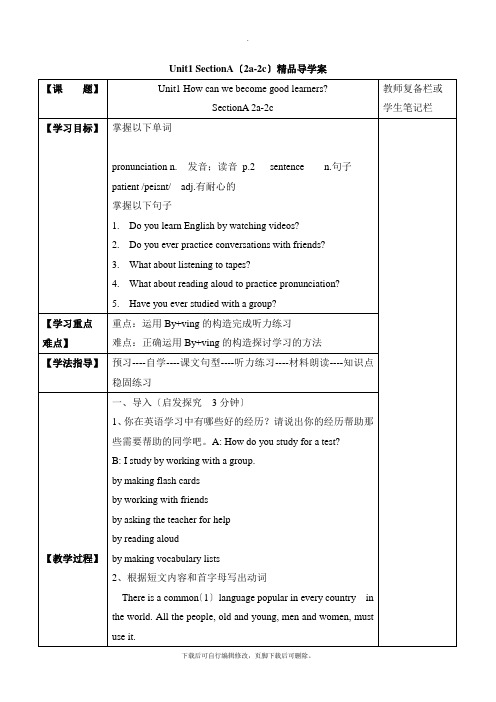
(2).对对方的帮助或要求表示委婉谢绝时,一般用:
◆ I don’t think so我认为不是这样◆Sorry, I can’t对不起,我不能◆I’d love to, but…◆ I’m afraid我愿意,但恐怕……
① –What about _______(listen) to some English songs? -- It’s great .
byasking the teacher for help
by reading aloud
by making vocabulary lists
2、根据短文内容和首字母写出动词
There is acommon〔1〕language popular in every country in the world. All the people, old and young, men and women, must use it.
【口诀】:分开是一段,合起是某时;分开s是倍次,合起s是有时
Mr. Green went to Sanya _____________(几次) last summer.
( ) I hope to visit the USA _____ in the future.
A. sometimes B. some times C. sometime D. some time
② Why not ___ your teacher for help when you can’t finish _____ it by yourself?
A. ask; write B. to ask; writing
C. ask; writing D. asking; write
人教版英语九年级全册Unit1 SectionA(3a-3c)精品导学案
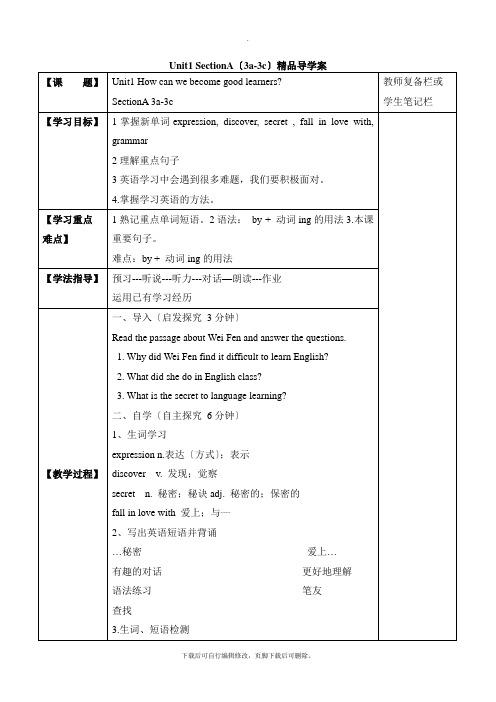
( )2. A. talked B. talk C. sing D. sang
( )3. A. thinkB. believe C. forgetD. understand
( )4. A. either B. neither C. also D. too
足球赛的票_______________________
2.Why did Wei Fen find it difficult to learn English?
find+宾语+adj.+to do sth. .
Wang Dan found it easy to learn English.
写出find的其他用法
II.单项选择
1.-How do you improve your listening?
-I improve it by ________.
A.watch English moviesB.to watch English movies
C.watching English movies D.watches
A. its B. that C.this D.it
III、完形填空
Last year my English class was ____1___for me. First of all, it wasn’t easy for me to understand the teacher when she ___2___to the class. To begin with, she spoke too quickly, and I couldn’t ___3___every word. Later on , I realized it doesn’t matter if you don’t understand every word, ___4___ I was afraid to speak in class because I thought my classmates might laugh ___5__me. I couldn’t always make complete sentences, either. Then I started to ___6___ English-language TV. It helped a lot. I think that doing lots of listening practice is one of the secrets of ___7___a good language learner. Another thing that I found very difficult was English ___8___. So I decided to take lots of grammar notes in every class.
人教版英语八年级上册 Unit 1 Section A (导学案)

第1单元Where did you go on vacation?Section A 单词anyone pron.任何人anywhere adv.在任何地方wonderful adj.精彩的;绝妙的few adj.&pron.不多;很少most adj.,adv.&pron.最多;大多数something pron.某事;某物nothing pron.没有什么;没有一件东西everyone pron.每人;人人;所有人myself pron.我自己;我本人yourself pron.你自己;您自己hen n.母鸡pig n.猪seem v.好像;似乎;看来bored adj.厌倦的;烦闷的someone pron.某人diary n.日记;记事簿短语go on vacation去度假anything special什么特别的stay at home待在家里have a good time玩得开心quite a few相当多;不少of course当然;自然句型1.—Did you go out with anyone? 你和别人一起出去的吗?—No. No one was here. Everyone was on vacation.不。
没有人在这里。
大家都去度假了。
2.—How was the food? 食物怎么样?—Everything tasted really good! 每样东西尝起来都很美味!Section B 单词activity n.活动enjoyable adj.有乐趣的;令人愉快的decide v.决定;选定try v.& n.尝试;设法;努力bird n.鸟bicycle n.自行车;脚踏车building n.建筑物;房子trader n.商人wonder v.想知道;琢磨difference n.差别;差异top n.顶部;表面wait v.等待;等候umbrella n.伞;雨伞wet adj.湿的;潮湿的;下雨的duck n.鸭below prep.&adv.在……下面;到……下面hungry adj.饥饿的as adv.像……一样;如同conj.当……时;如同hill n.小山;山丘dislike v.&n.不喜爱(的事物);厌恶(的事物)enough adj.&adv.足够的(地);充足的(地);充分的(地)短语feel like给……的感觉;感受到because of因为arrive in到达 a lot of许多;大量的take some photos拍一些照片too many太多句型1.There are a lot of new buildings now, but many of the old buildings are still there. 现在那里有许多新的建筑物,但是许多老式的建筑物还在那里。
新目标英语八年级上册 unit1 Section A 导学案
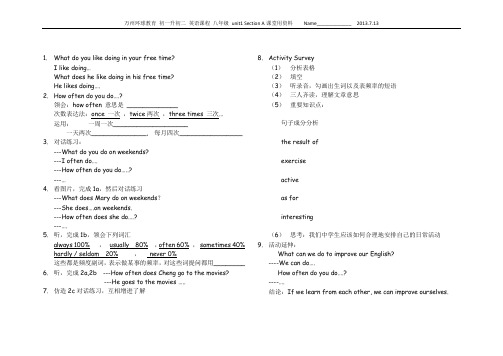
万州环球教育初一升初二英语课程八年级unit1 Section A课堂用资料Name_____________ 2013.7.131.What do you like doing in your free time?I like doing…What does he like doing in his free time?He likes doing….2.How often do you do….?领会:how often 意思是_____________次数表达法:once 一次,twice两次,three times三次…运用:一周一次___________________一天两次______________, 每月四次________________ 3.对话练习:---What do you do on weekends?---I often do….---How often do you do…..?---…4.看图片,完成1a,然后对话练习---What does Mary do on weekends?---She does….on weekends.---How often does she do….?---….5.听,完成1b,领会下列词汇always 100%,usually 80%,often 60%,sometimes 40% hardly / seldom 20%,never 0%这些都是频度副词,表示做某事的频率,对这些词提问都用________ 6.听,完成2a,2b ---How often does Cheng go to the movies?---He goes to the movies …..7.仿造2c对话练习,互相增进了解8.Activity Survey(1)分析表格(2)填空(3)听录音,勾画出生词以及表频率的短语(4)三人齐读,理解文章意思(5)重要知识点:句子成分分析the result ofexerciseactiveas forinteresting(6)思考:我们中学生应该如何合理地安排自己的日常活动9.活动延伸:What can we do to improve our English?----We can do….How often do you do….?----….结论:If we learn from each other, we can improve ourselves.。
山西省泽州县晋庙铺镇初级中学校人教新目标板九年级英语全一册导学案:Unit1SectionA1a-1c(答案不全)
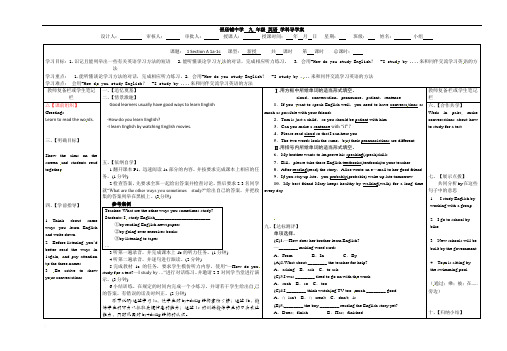
晋庙铺中学九年级英语学科导学案设计人:审核人:审批人:授课人:授课时间:年月日星期:班级:姓名:小组课题:1 Section A 1a-1c 课型:新授共课时第课时总课时:学习目标:1.识记且能列举出一些有关英语学习方法的短语 2.能听懂谈论学习方法的对话,完成相应听力练习。
3. 会用-How do you study English? -I stud y by ....来和同伴交流学习英语的方法学习重点: 1.能听懂谈论学习方法的对话,完成相应听力练习。
2. 会用-How do you study English? -I study by ....来和同伴交流学习英语的方法学习难点:会用-How d o you study English? -I study by ....来和同伴交流学习英语的方法教师复备栏或学生笔记栏一、【追忆奠基】二、【情景激趣】Good learners usually have good ways to learn English-How do you learn English?-I learn English by watching English movies.来源学科网][来源学科网五、【依纲自学】来源学科网ZXXK]1.翻开课本P1,迅速阅读1a部分的内容。
并按要求完成课本上相应的任务。
(1分钟)2.检查答案,先要求全班一起给出答案并检查讨论。
然后要求2-3名同学就“What are the other ways you sometimes study?”给出自己的答案,并把收集的答案列举在黑板上。
(3分钟)参考案例Teacher: What are the other ways you sometimes study?Students: I study English_______________________ .[来源学科网]①by reading Eng lish newspapers②by going over exercises books③by listening to tapes…3.听第一遍录音,并完成课本上1b的听力任务。
2020年人教版英语九年级Unit1 全单元导学案设计
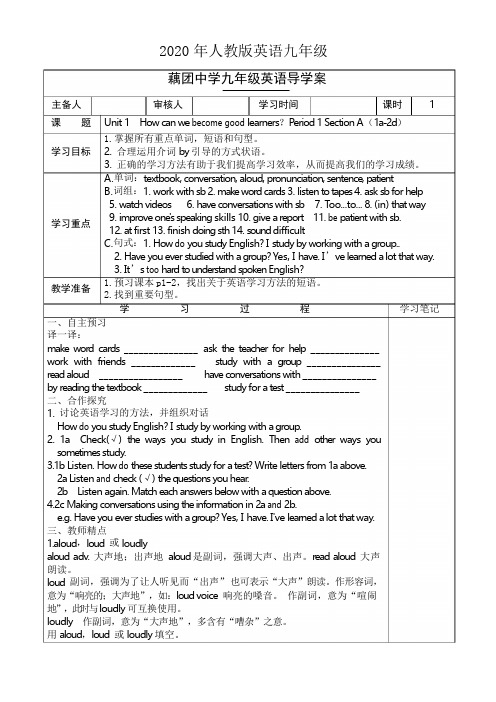
2020年人教版英语九年级藕团中学九年级英语导学案主备人审核人学习时间课时1课题Unit1How can we become good learners?P eriod1Section A(1a-2d)1.掌握所有重点单词,短语和句型。
学习目标 2.合理运用介词by引导的方式状语。
3.正确的学习方法有助于我们提高学习效率,从而提高我们的学习成绩。
A.单词:textbook,conversation,aloud,pronunciation,sentence,patientB.词组:1.work with sb2.mak e word cards3.listen t o tapes4.ask sb for help5.watch videos6.have conversations with sb7.T oo...to...8.(in)that way学习重点教学准备9.improve one's speaking skills10.give a report11.be patient with sb.12.at first13.finish doing sth14.s oun d difficultC.句式:1.How do you study English?I study by working with a group..2.Have you ever studied with a gr oup?Yes,I have.I’ve learned a lot that way.3.It’s too har d t o understand spok en English?1.预习课本p1-2,找出关于英语学习方法的短语。
2.找到重要句型。
学习过程学习笔记一、自主预习译一译:mak e word cards_______________ask the teacher for help______________ work with friends_____________study with a gr o up_______________ r ead aloud_________________have conversations with_______________ by reading the textbook_____________study for a test_______________二、合作探究1.讨论英语学习的方法,并组织对话How do you study English?I study by working with a group.2.1a Check(√)the ways you study in English.Then add other ways you sometimes study.3.1b Listen.How do these students study for a test?Write letters from1a above.2a Listen and check(√)the questions you hear.2b Listen again.Match each answers below with a question above.4.2c Making conversations using the information in2a and2b.e.g.Have you ever studies with a gr oup?Yes,I have.I've learned a lot that way.三、教师精点1.aloud,loud或loudlyaloud adv.大声地;出声地aloud是副词,强调大声、出声。
仁爱英语新版七年级上册Unit 1Topic1 SectionA导学案

Unit 1 Making New FriendsTopic 1 Welcome to China!(总第1课时)Section A 1a—3c【学习目标】:1、学习字母Aa-Gg.2、学习新单词:good, morning, welcome, to, China, thank, you, hello, I, am, are, yes, no, not, nice, meet, too3、学习怎么和别人打招呼和介绍自己。
【学习重点】:使学生学会打招呼和介绍自己:(1)—Good morning. (2)—Welcome to China! (3)—Hello/Hi!—Good morning. —Thank you./Thanks. —Hello/Hi!(4)—I’m … Are you …? (5)—Nice to meet you.—Yes, I am./No, I’m not. I’m …—Nice to meet you, too.【学习过程】:一、走入新课:1. 借助肢体语言和大家一起学习领会招呼语“Good morning!”,“Hi!”和“H ello!”。
2. 拿出点名册走到一位新同学前面说:“Are you Wang Lin?”引导该同学感悟出:“Yes , I am./ No ,I’m not.”。
3.设想一个外国人到我们学校来参观,如何问候他们呢?老师先走上前和对方握手说:Nice to meet you!和Welcome to China!引导对方说:Nice to meet you!too.和Thanks./Thank you二、阅读提示1:1.听1a和3a.,学会并听懂“G ood morning!”,“Hi!”,“H ello!”,“Are you…?”,“Yes ,Iam./ No ,I’m not.”。
2.读1a和3a.并且理解1a 和3a.的意思。
3.找出不懂的其它词汇:______________________________________________________________________4.听1a和3a后,学会自我介绍用:I am……【多元互动合作探究】1. 成组练习。
初一七年级上册英语人教版Unit 1《My name's Gina》Section A 05 导学案

Unit 1 My name’s Gina.学案Section A(1a-1c)【学习目标】1.主动与人打招呼并介绍自己,询问对方姓名,学会问候他人并结交新朋友。
--What’s your name? --My name’s Gina. / I’m Gina/ Gina.--Nice to meet you. --Nice to meet you, too.2.掌握形容词性物主代词my, your的用法及be(am is are)动词的使用。
What’s your name?My name is…I am ...【学习重点】1.形容词性物主代词一定要后接名词.my book.(我的书)2.句子的书写,人名的书写。
【学习难点】动词be的现在式(am, is ,are)及其用法。
如何使用这三种形式主要取决于主语。
当主语是第一人称I(我)时,用am, 缩写为I’m;主语是第二人称you(你)或复数(你们)时,用are, 缩写为you’re,主语是第三人称it/she/he (它/她/他)或名词及代词的单数时,用is, 缩写为it’s /she’s /he’s。
如:①I am (I’m) Liu Ying. ②.Are you Lin Tao?【学习过程】一、目标呈现1、创设情境--自我介绍,询问对方姓名。
让学生在口语交流的过程中领会my name , your name ,I’m ...所表示的意义。
2、导入话题,解读目标二、自主合作学习任务一:会读写本课时的7个单词。
1、个人自读,记忆单词。
2、自查单词。
将对应的单词写在横线上。
名字_____ 令人愉快的 ____ 常用于动词之前,表示该动词为不定式 _____遇见 ____ 也______ 你的 _________ 我的______(用于女子的姓式或姓名前,不指明婚否)女士_______ 布朗女士___________3、认真观察1a中的图画,写出图中物品的英文名称,教师核对答案。
人教版英语九年级全册Unit1__SectionA(2d、Grammar__Focus-4c)精品导
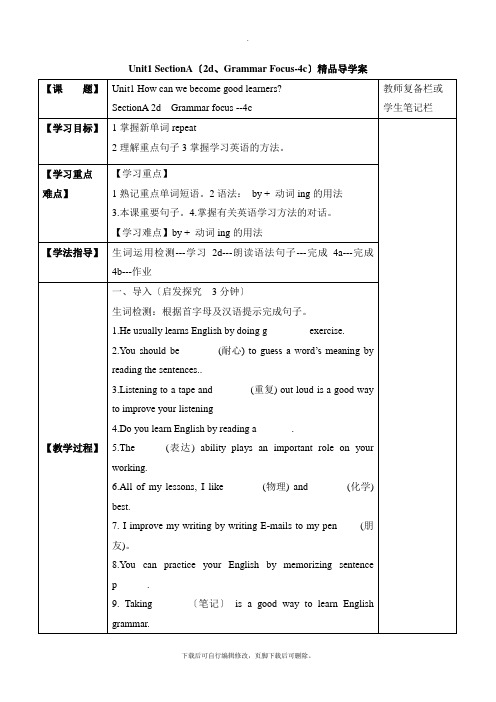
10.You made a mistake in this s__________.
选择
( ) 1.is really hardthem to climb Mount Huang.
A. This, to. B. It, for C. This, for D. It, to
________help.
A.from B.on C.for D.to
3.Lillian said memorizing the words of pop songs helped_______.
A.a lot ofB. lot of C. a little D. a little of
4.________she study Japanese so well?
( ) ____ you eat, ____ you will get.
A. The much ; the fat B. The more ; fatter
C. The more ; the fatter D. More; the fatter
2、总结介词by的用法.
1〕.Some are drawing by〔beside〕the lake.
A. the same B. as well C. either D. too
( ) 8. You should often practice, or you can’t win the game.
A. run B. to run C. running D. to running
二、自学〔自主探究6分钟〕
五、练评〔包含“考点链接〞应用探究6分钟〕
鲁教版英语(五四制)七年级上册_Unit1_Section_A(1a-2c)导学案
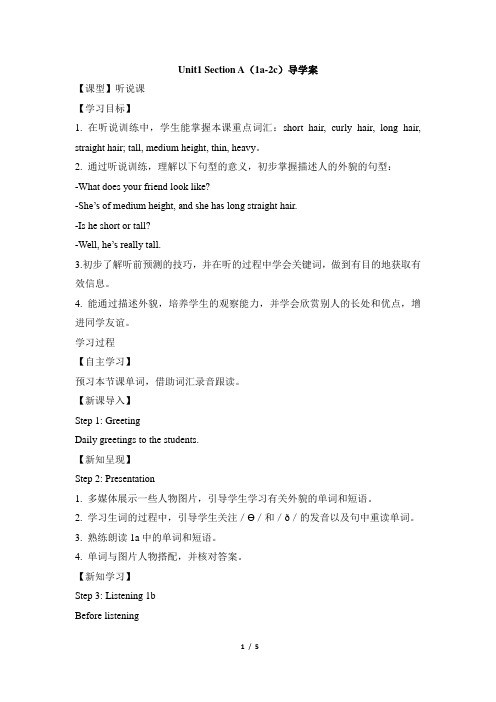
Unit1 Section A(1a-2c)导学案【课型】听说课【学习目标】1. 在听说训练中,学生能掌握本课重点词汇:short hair, curly hair, long hair, straight hair; tall, medium height, thin, heavy。
2. 通过听说训练,理解以下句型的意义,初步掌握描述人的外貌的句型:-What does your friend look like?-She’s of medium height, and she has lon g straight hair.-Is he short or tall?-Well, he’s really tall.3.初步了解听前预测的技巧,并在听的过程中学会关键词,做到有目的地获取有效信息。
4. 能通过描述外貌,培养学生的观察能力,并学会欣赏别人的长处和优点,增进同学友谊。
学习过程【自主学习】预习本节课单词,借助词汇录音跟读。
【新课导入】Step 1: GreetingDaily greetings to the students.【新知呈现】Step 2: Presentation1. 多媒体展示一些人物图片,引导学生学习有关外貌的单词和短语。
2. 学习生词的过程中,引导学生关注/Ɵ/和/ð/的发音以及句中重读单词。
3. 熟练朗读1a中的单词和短语。
4. 单词与图片人物搭配,并核对答案。
【新知学习】Step 3: Listening 1bBefore listening1. 认真观察la图片,在车站门口的几个男孩身边简单注明描述外貌的单词。
如:h注明tall,curly hair。
2. 学生自读la图片不完整对话。
While listening1. 播放录音,把la图片中的对话补充完整。
注意有关外貌的关键词,找到Amy 的朋友。
2. 齐读描述Amy朋友外貌的句子。
3. 再播放录音,跟读时注意对话中的重读单词。
2020人教版七年级英语下册Unit 1Section A (Grammar - 3c)导学案(附答案)
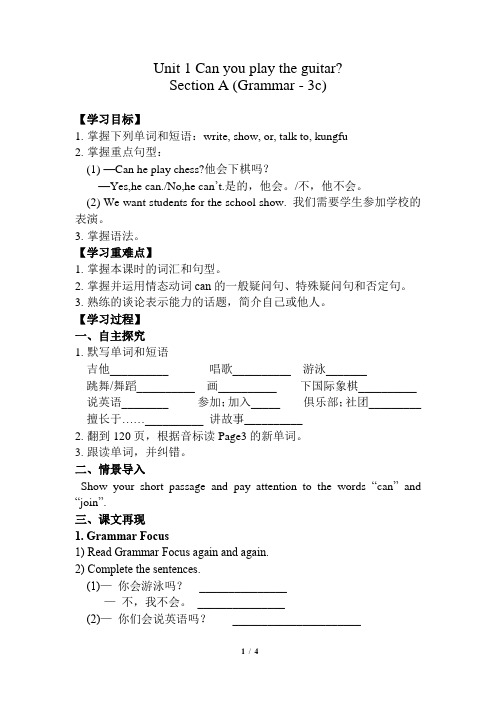
Unit 1 Can you play the guitar?Section A (Grammar - 3c)【学习目标】1.掌握下列单词和短语:write, show, or, talk to, kungfu2.掌握重点句型:(1)—Can he play chess?他会下棋吗?—Yes,he can./No,he can’t.是的,他会。
/不,他不会。
(2)We want students for the school show. 我们需要学生参加学校的表演。
3.掌握语法。
【学习重难点】1.掌握本课时的词汇和句型。
2.掌握并运用情态动词can的一般疑问句、特殊疑问句和否定句。
3.熟练的谈论表示能力的话题,简介自己或他人。
【学习过程】一、自主探究1.默写单词和短语吉他__________ 唱歌__________游泳_______跳舞/舞蹈__________ 画__________下国际象棋__________说英语________参加;加入_____ 俱乐部;社团_________擅长于……__________讲故事__________2.翻到120页,根据音标读Page3的新单词。
3.跟读单词,并纠错。
二、情景导入Show your short passage and pay attention to the words “can”and “join”.三、课文再现1. Grammar Focus1) Read Grammar Focus again and again.2) Complete the sentences.(1)—你会游泳吗?_______________—不,我不会。
_______________(2)—你们会说英语吗?______________________—是的,会。
______________________(3)— 她会下棋吗?_________________— 不会。
2024年新版人教版七年级上册英语Unit 1(第2课时)(导学案)
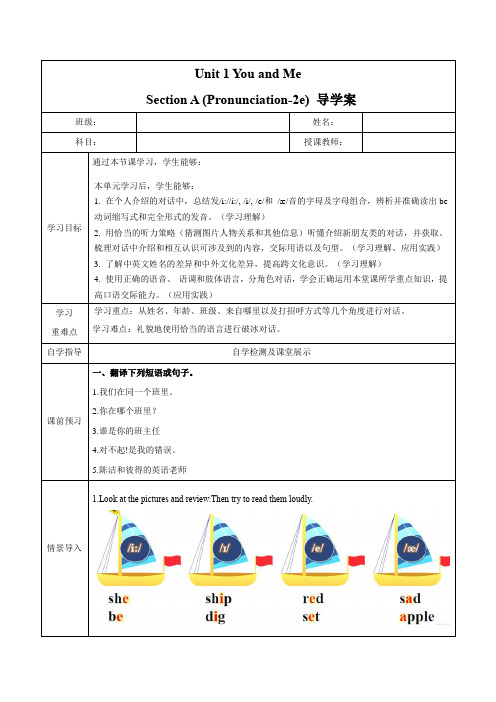
1.Look at the pictures and review.Then try to read them loudly.1.Listen and repeat2.Let’s know more about our new friends_________________________________________________________________________________________________________________________________________________________________________________________________________________________________________________________________1.Pronunciation:Help them find their friends_________________________________________________________________________________2.Listen and circle the sentences you hear.Then repeat them.3.Pay attention to the pronunciation of the contractions.4.2a Look and guess①Who are they in the photo?__________________________________________________________②Where are they ?__________________________________________________________③How do you think they feel ?__________________________________________________________ 5.2a Listen to the conversation and circle the words you hear.6.2b Read the conversation and answer the questions.①Who is Mr Smith ?A.Chen Jie’s class teacher.B. Chen Jie and Peter’s English teacher②What is Ms Gao’s first name ?A Hui B.Gao③Why did Peter make the mistake?______________________________________________________7.Read the conversation and complete the table with the information about Mr Smith and Peter.8.Listen again and pay attention to the pronunciation of who’s, I’m, he’s, and it’s. Then role-play the conversation.Complete the table with what you know about these students.Then introduce(介绍)them to your classmates.This is my new friend,__________(name).He/She’s in_____________(class).He/She’s from_____________(country).He/She’s _______________(age).His/Her class teacher is Mr/Ms_________.【参考答案】1.Listen and repeat略2.Let’s know more about our new friends1.Pronunciation:Help them find their friends2.Listen and circle the sentences you hear.Then repeat them.3.Pay attention to the pronunciation of the contractions.4.2a Look and guess①Who are they in the photo?They are a teacher and two students.Maybe they are classmates.②Where are they ?They are in the school.③How do you think they feel ?They look happy.5.2a Listen to the conversation and circle the words you hear.6.2b Read the conversation and answer the questions.①B ②A ③Because of cultural differences.(文化差异)7.Read the conversation and complete the table with the information about Mr Smith and Peter.8.Listen again and pay attention to the pronunciation of who’s, I’m, he’s, and it’s. Then role-play the conversation.一、请将下列单词按照其划线字母的读音归类。
Unit 1 导学案
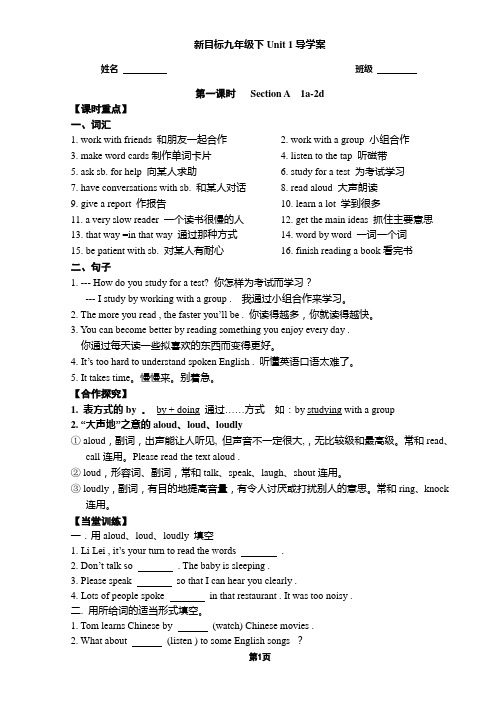
第一课时Section A 1a-2d【课时重点】一、词汇1. work with friends 和朋友一起合作2. work with a group 小组合作3. make word cards制作单词卡片4. listen to the tap 听磁带5. ask sb. for help 向某人求助6. study for a test 为考试学习7. have conversations with sb. 和某人对话8. read aloud 大声朗读9. give a report 作报告10. learn a lot 学到很多11. a very slow reader 一个读书很慢的人12. get the main ideas 抓住主要意思13. that way =in that way 通过那种方式14. word by word 一词一个词15. be patient with sb. 对某人有耐心16. finish reading a book看完书二、句子1. --- How do you study for a test? 你怎样为考试而学习?--- I study by working with a group . 我通过小组合作来学习。
2. The more you read , the faster you’ll be . 你读得越多,你就读得越快。
3. You can become better by reading something you enjoy every day .你通过每天读一些拟喜欢的东西而变得更好。
4. It’s too hard to understand spoken English . 听懂英语口语太难了。
5. It takes time。
慢慢来。
别着急。
【合作探究】1. 表方式的by 。
by + doing 通过……方式如:by studying with a group2. ―大声地‖之意的aloud、loud、loudly① aloud,副词,出声能让人听见, 但声音不一定很大,,无比较级和最高级。
人教版七年级英语下册《Unit1Section A2d—3c》导学案
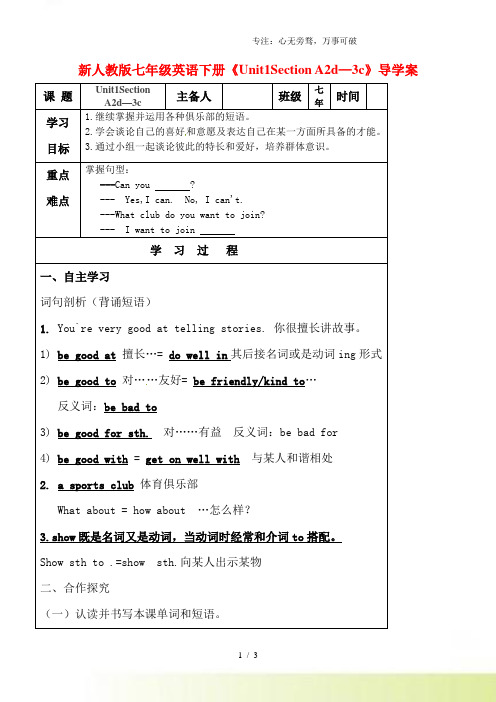
新人教版七年级英语下册《Unit1Section A2d—3c》导学案课题Unit1SectionA2d—3c 主备人班级七年时间学习目标1.继续掌握并运用各种俱乐部的短语。
2.学会谈论自己的喜好和意愿及表达自己在某一方面所具备的才能。
3.通过小组一起谈论彼此的特长和爱好,培养群体意识。
重点难点掌握句型:---Can you ?--- Yes,I can. No, I can't.---What club do you want to join? --- I want to join学习过程一、自主学习词句剖析(背诵短语)1. You`re very good at telling stories. 你很擅长讲故事。
1) be good at擅长…= do well in其后接名词或是动词ing形式2) be good to对……友好= be friendly/kind to…反义词:be bad to3) be good for sth.对……有益反义词:be bad for4) be good with = get on well with与某人和谐相处2. a sports club体育俱乐部What about = how about …怎么样?3.show既是名词又是动词,当动词时经常和介词to搭配。
Show sth to .=show sth.向某人出示某物二、合作探究(一)认读并书写本课单词和短语。
(二)小组合作学习1.分角色朗读并翻译2d 。
2.复述并模仿对话。
(三)背诵Grammar Focus.(四)完成3a、3b、3c.【课堂练习】一、根据句意及词首字母写出单词。
1.John wants to j ________ the music club.2.Can you s ________ English?3.I can play the guitar but can't play the p ________. 4.The girl can dance w .5.Can you s ________ me the book?二、用完整形式回答问题。
人教版2019-2020年七年级英语下册Unit 1 Section A (2a—3b)导学案(无
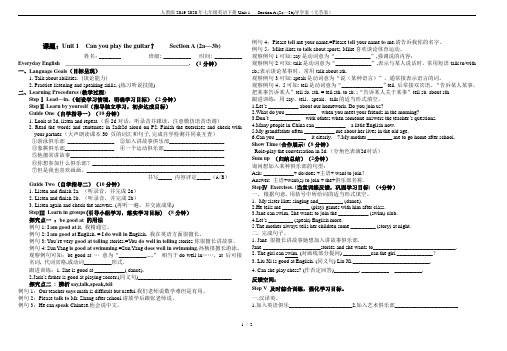
课题:Unit 1 Can you play the guitar ? Section A (2a —3b)姓名:________ 班级: __________ 时间: __________ Everyday English _____________________________________________. (1分钟) 一、Language Goals (目标呈现)1. Talk about abilities. (谈论能力)2. Practice listening and speaking skills. (练习听说技能) 二、Learning Procedures (教学过程)Step Ⅰ Lead —in.(创设学习情境,明确学习目标)(2分钟)Step Ⅱ Learn by yourself (指导独立学习,初步达成目标) Guide One (自学指导一)(10分钟) 1. Look at 2d, listen and repeat.(看2d 对话,听录音并跟读,注意模仿语音语调) 2. Read the words and sentences in 2a&2d aloud on P2. Finish the exercises and check with your partner.(大声朗读课本50 页的词汇和句子,完成自学检测并同桌互查) ①游泳俱乐部 _________________ ②加入讲故事俱乐部____________________ ③象棋俱乐部__________________ ④一个运动俱乐部______________________ ⑤他擅常讲故事________________________________________________________ ⑥你想参加什么俱乐部?________________________________________________ ⑦但是我也喜欢画画。
河南商丘红旗中学七年级上册英语导学案设计Unit1 Section A (无答案)

Unit 1 Making New FriendsTopic 1 Weicome to ChinaSection A一、成功学习1、成功目标(1)掌握A-G字母的发音、顺序及书写,并区分印刷体和手写体,大写和小写。
(2)能用英语进行简单的交流。
2、成功自学(自主学习,享受探究乐趣)通过观察音标,试着品读下面单词:A aB bC cD dE eF fG g英汉互译Good welcome ChinaThank the USA the UKNice meetWelcome to China.3、成功合作(自学收获有多少,量学见分晓,独立完成后小组交流展示)(1)组长带领组员解决自学过程中的疑惑。
(2)小组成员全员参与,组长明确分工,共同解决自学方法中的问题,没有把握的请老师帮助。
(3)合作完成的小组可以进入量学检测一下自学效果。
4、成功展示(独立完成,相信你能达到本节课的学习目标)1、基础题(1)正确书写A-G七个字母二、成功精学三、成功测学基础题(1)单项选择()1、— you Li Ping?—Yes, .A.Are;I amB.Am;I’m notC. Are; I am not( )2、—— Nice to meet you,too.A.ThanksB.Thank youC.Nice to meet you.(2)从II中找出I栏中的答语。
I II()1.Hello,Michael! A.No,I’m not .I’m Li Fang.( ) 2.Welcom to Beijing,Jane. B.Nice to meet you,too( ) 3.Good morning,Kangkang! C.Thank you( ) 4.Nice to meet you,Maria. D.Hello,Liangliang!( ) 5.Are you Lingling? E.Good morning,Jack!。
- 1、下载文档前请自行甄别文档内容的完整性,平台不提供额外的编辑、内容补充、找答案等附加服务。
- 2、"仅部分预览"的文档,不可在线预览部分如存在完整性等问题,可反馈申请退款(可完整预览的文档不适用该条件!)。
- 3、如文档侵犯您的权益,请联系客服反馈,我们会尽快为您处理(人工客服工作时间:9:00-18:30)。
Unit 1 Can you come to my party? Section A导学案
【学习目标】
1.学会邀请别人并根据自己的安排欣然接受别人的邀请或礼貌拒绝别人的邀请。
2.能给出不能接受别人邀请的具体理由。
3.提高自己的听、说能力。
4.通过在邀请或被邀请的过程中耐心寻求或给予各自的信息以提升自己说的能力。
【重点,难点】
掌握做出、接受和拒绝邀请的习惯用句;使用“have/has to”给出不能接受邀请的原因。
【导学指导】
温故知新
一、完成下列问题。
1.请在横线上罗列5个情态动词。
______________________________________________________________________ ________
2.“must”表示“必须”,否定式缩写为________,其含义为_____________。
若表示“不必,没必要”应该使用_______________或______________。
3.He can play the piano very well.(变为否定句)
He _______ play the piano very well.
4.I must finish my homework today.(变为疑问句)
—______ I finish my homework today?
—No, you ________./____________________.
二、自主互助学习
1. 拜访我的阿姨_______________;
2. 去看医生________________;
3. 帮助我的
父母_________;
4. 上钢琴课___________________;
5. 为考试学习_______________;
6.在星期六下午
______________。
三.Listening(twice)
who or Reasons(have to )
Carlos
Kay
四,Groupwork
Friend’s Name Can/Can’t Why ?
Dave can’t too much homework
Sample(示范):Report
My friend Dave can`t come to my party. She has too much homework. And Lucy can
come to my party.But
__________________________________________________________________________ __________________________________________________________________________ __________________________________________________________________________ __________________________________________________________________________ ____________________
五.当堂检测
一)选择正确答案
1.—Can you come to my party?
—Sure, _________.
A.I like it very much
B. I’d love
C. I’d like it
D. I’d love to
2.—Must I hand in my math homework this afternoon?
— No, you _________. You can do that tomorrow.
A. mustn’t
B. don’t have
C. doesn’t have to
D. needn’t
3.—Could you please help your parents with some housework on weedends?
—Yes, I ______.
A. could
B. couldn’t
C. can
D. sure.
二)根据要求填空
1.In my opinion, you needn’t go to see the doctor.(变为同义句)
In my opinion, you _______ _________ _________ go to see the doctor.
2.I have to study ______ the test so I can’t go with you ______ Sunday morning.
(用介词填空)
3.Their teacher ________(have) to stay up late to get ready for the classes next morning.(用所给词的正确形式填空)
4.When you are ill, you need _________(go) to see the doctor.(用所给词的正确形式填空)
5.How do you like this game?(变为同义句)
______ do you ______ ______ this game?
6. How about ________(visit) our grandparents this summer holiday?(用所给词的正确
形式填空)
7. What about going skateboarding this weekend?(变为同义句)
________ ________ go skateboarding this weekend?
【课堂练习】
一、使用“too many”、“too much”或“much too”填空。
1.__________ people buy this book because it’s ___________ interesting .
2.There are ____________ means of transportation nowadays. However, a small nu mber of people take the air because it’s ____________ expensive and kind of dangerous.
3.Although he has ____________ money, he still feels lonely
二、同义句互换。
1.I’m sorry I can’t. I have to help my parents do some farm work this weekend.
I’m sorry I can’t. I_________ _____________ my parents do some farm work this weekend.
2.I’m sorry I can’t. I’m going to the airport to see my best friend off.
I’m sorry I can’t. I ________ _________ go to the airport to see my best friend off.
3.Thanks for asking . Thanks for your _____________.
课后反思:。
